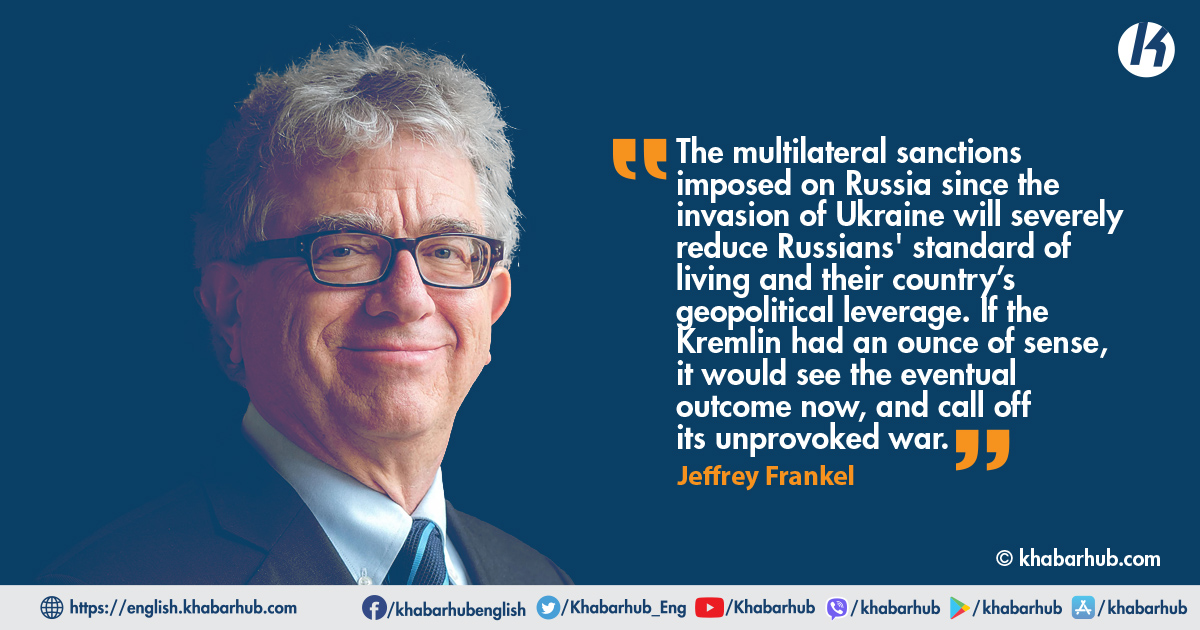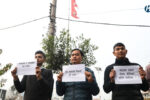The surprising potency of the multilateral sanctions imposed on Russia has been exceeded only by that of Ukrainians’ resistance to Russia’s invasion of their country.
True, it is difficult to imagine that sanctions will bring the Russian economy to its knees faster than Russian troops are able to capture Kyiv or lay waste to the country. But, ultimately, Russia will lose much in this war.
Back in December, US President Joe Biden warned Russian President Vladimir Putin that severe sanctions in response to a Russian invasion of Ukraine would impose “a terrible price.” Yet, many viewed these threats as exaggerated bluster.1
One can see why. At least since the turn of the century, US presidents have had a poor record when it comes to matching word and deed in foreign policy. There were even more grounds for skepticism regarding warnings from Europe.
Germany, for example, had spent the preceding decade increasing its reliance on Russian energy. And the Western sanctions triggered by Russia’s 2014 seizure of Crimea failed to have the desired effect.
More generally, international sanctions need to be multilateral to succeed, and most have accomplished relatively little.
As one of the few options between armed intervention and doing nothing, sanctions are usually just a way for a country to register a strong protest.
A macroeconomic perspective can help tie things up. The biggest categories of sanctions – penalties on imports from Russia, restrictions on exports to Russia, and financial sanctions – can be viewed as three mutually reinforcing means to the same end.
But the impressive array of measures currently trained on the Russian economy are different. They fit into seven main categories.
The first category includes sanctions on Russian exports of oil and natural gas. On March 8, the United States banned hydrocarbon imports from Russia, while the United Kingdom announced that it will phase out its imports of Russian crude by the end of the year.
But the most dramatic sign that multilateral sanctions would be serious this time came on February 22, when German Chancellor Olaf Scholz unexpectedly suspended the Nord Stream 2 pipeline, which would have delivered Russian gas directly to Germany.
Soon afterward, the European Union announced plans to cut its gas imports from Russia by two-thirds this year, and by more later.
Here, my Harvard colleague Ricardo Hausmann has a smart idea for how to inflict maximum damage on Russia, rather than on oil-importing countries.
The US, Europe, and an alliance of others could drastically reduce their collective demand for Russian oil and gas via a punitive tariff instead of a quantitative limit.
So, rather than Russian producers enjoying a windfall from higher prices, the tariff revenue would go to the importing governments – which could then distribute it domestically in crowd-pleasing ways.
The second category of sanctions comprises penalties against Russia’s non-oil exports. Canada was the first to suspend Russia’s most-favored nation trade status, in order to apply higher tariffs on Russian products. The US, EU, and the rest of the G7 countries have since followed suit.
Third, many multinational corporations are “self-sanctioning” and getting out ahead of their home-country governments by avoiding doing business with Russia. This is why Urals crude is selling at a steep discount relative to the Brent benchmark index.
Embargoes on exports to Russia constitute a fourth type of economic penalty. Because Russia is dependent on particular US and European products, especially technological goods like semiconductors, lasers, and navigational and telecommunications equipment, being cut off from these items will likely inflict severe economic damage.
If Russia lacks spare parts for American-built airplanes, for example, even domestic air travel is likely to become increasingly difficult over time.
Closely related to this is the withdrawal of foreign investors, as Western firms – including PepsiCo, Unilever, Zara, Ikea, and Goldman Sachs – suspend or terminate their operations in Russia.
Fifth, financial sanctions have been significantly stronger than expected. Before the invasion, cutting off Russian banks from the global financial system, for example by barring them from the SWIFT system for international payments, seemed an ambitious goal.
But the US and its allies accomplished that and a lot more. In an unprecedentedly bold move, the US Treasury, together with the EU, Japan, other G7 countries, Switzerland, South Korea, and Singapore, denied the Russian authorities access to much of the country’s $630 billion of foreign-exchange reserves and other overseas assets.
As a result, the ruble plummeted 30%. The depreciation is likely to continue, and will rapidly feed into higher inflation, which was already 9.2% year on year in February.
Sanctions on Russia’s elites represent a sixth category. Penalties targeting individuals have been a growing component of “smart sanctions” for several years.
The new sanctions against Russia are notable for targeting Putin himself and for getting serious about preventing Russian oligarchs from traveling freely and accessing their overseas assets, including real estate in London and yachts in the Mediterranean.
If the Kremlin had an ounce of sense – which it evidently does not – it would see the eventual outcome now, and call off the invasion.
Finally, much of the world is shunning Russian participation in international sporting events and cultural activities. This might matter more than economists think it does.
A macroeconomic perspective can help tie things up. The biggest categories of sanctions – penalties on imports from Russia, restrictions on exports to Russia, and financial sanctions – can be viewed as three mutually reinforcing means to the same end.
Even when Russia is able to ship oil and natural gas abroad, it cannot get paid. And even if it could get paid, the money is of little use if it cannot purchase the imports it needs.
The sanctions will reorient other economies away from Russia on a long-term basis. Once built, a liquefied natural gas terminal will not be unbuilt.
The world’s eleventh-largest economy will thus fall behind Brazil and others in the GDP rankings, severely impairing Russians’ standard of living and reducing their country’s geopolitical leverage.
If the Kremlin had an ounce of sense – which it evidently does not – it would see the eventual outcome now, and call off the invasion.
(Jeffrey Frankel is Professor of Capital Formation and Growth at Harvard University)
Copyright: Project Syndicate









Comment